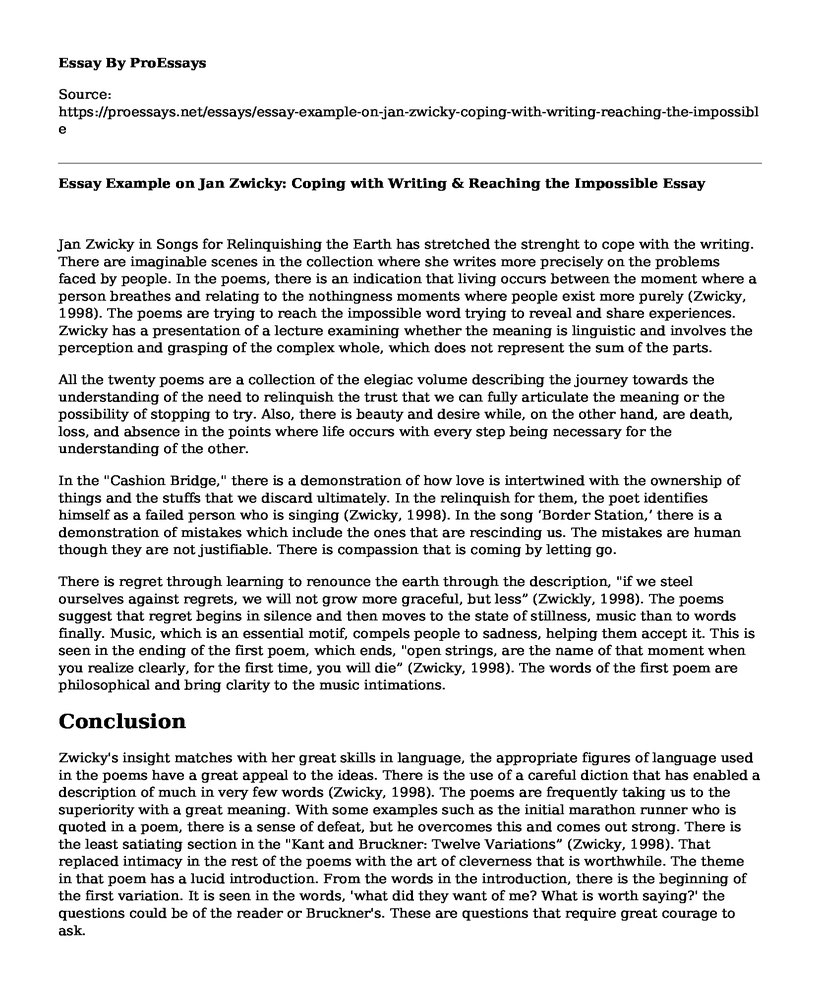Jan Zwicky in Songs for Relinquishing the Earth has stretched the strenght to cope with the writing. There are imaginable scenes in the collection where she writes more precisely on the problems faced by people. In the poems, there is an indication that living occurs between the moment where a person breathes and relating to the nothingness moments where people exist more purely (Zwicky, 1998). The poems are trying to reach the impossible word trying to reveal and share experiences. Zwicky has a presentation of a lecture examining whether the meaning is linguistic and involves the perception and grasping of the complex whole, which does not represent the sum of the parts.
All the twenty poems are a collection of the elegiac volume describing the journey towards the understanding of the need to relinquish the trust that we can fully articulate the meaning or the possibility of stopping to try. Also, there is beauty and desire while, on the other hand, are death, loss, and absence in the points where life occurs with every step being necessary for the understanding of the other.
In the "Cashion Bridge," there is a demonstration of how love is intertwined with the ownership of things and the stuffs that we discard ultimately. In the relinquish for them, the poet identifies himself as a failed person who is singing (Zwicky, 1998). In the song ‘Border Station,’ there is a demonstration of mistakes which include the ones that are rescinding us. The mistakes are human though they are not justifiable. There is compassion that is coming by letting go.
There is regret through learning to renounce the earth through the description, "if we steel ourselves against regrets, we will not grow more graceful, but less” (Zwickly, 1998). The poems suggest that regret begins in silence and then moves to the state of stillness, music than to words finally. Music, which is an essential motif, compels people to sadness, helping them accept it. This is seen in the ending of the first poem, which ends, "open strings, are the name of that moment when you realize clearly, for the first time, you will die” (Zwicky, 1998). The words of the first poem are philosophical and bring clarity to the music intimations.
Conclusion
Zwicky's insight matches with her great skills in language, the appropriate figures of language used in the poems have a great appeal to the ideas. There is the use of a careful diction that has enabled a description of much in very few words (Zwicky, 1998). The poems are frequently taking us to the superiority with a great meaning. With some examples such as the initial marathon runner who is quoted in a poem, there is a sense of defeat, but he overcomes this and comes out strong. There is the least satiating section in the "Kant and Bruckner: Twelve Variations” (Zwicky, 1998). That replaced intimacy in the rest of the poems with the art of cleverness that is worthwhile. The theme in that poem has a lucid introduction. From the words in the introduction, there is the beginning of the first variation. It is seen in the words, 'what did they want of me? What is worth saying?' the questions could be of the reader or Bruckner's. These are questions that require great courage to ask.
References
Zwicky, J. (1998). Songs for relinquishing the earth. Brick Books.
Cite this page
Essay Example on Jan Zwicky: Coping with Writing & Reaching the Impossible. (2023, Sep 07). Retrieved from https://proessays.net/essays/essay-example-on-jan-zwicky-coping-with-writing-reaching-the-impossible
If you are the original author of this essay and no longer wish to have it published on the ProEssays website, please click below to request its removal:
- American Noirs Comparative Essay
- Literary Analysis Essay on The Prince and Hamlet
- Race in To Kill a Mockingbird Essay Example
- Suffering Breeds in Wisdom: King Lear Essay
- The African Americans Many River to Cross Episode 2 Essay Example
- Analysis of Sophocles' Antigone Essay Example
- Essay Example on John Smith Patterson: Presenting South Carolina's Wish to Secede







